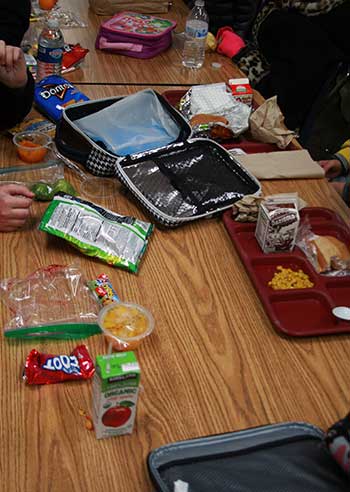Learn to reduce, reuse, recycle, and rot (compost) to decrease the waste that goes into landfills.
 Identify ways for the school community to eliminate and divert waste, and teach students and staff to use less and recycle properly. This might include separating food scraps in the cafeteria, instituting a Share Table, or outfitting your school with proper recycling bins. Other projects could include replacing single-use silverware, dishes and trays with durables, or taking advantage of programs that deal with hard to recycle items.
Identify ways for the school community to eliminate and divert waste, and teach students and staff to use less and recycle properly. This might include separating food scraps in the cafeteria, instituting a Share Table, or outfitting your school with proper recycling bins. Other projects could include replacing single-use silverware, dishes and trays with durables, or taking advantage of programs that deal with hard to recycle items.
This is a great opportunity for the school community to:
- Recognize how much waste we generate
- Learn where garbage goes once it is collected
- Improve school-wide recycling practices
- Reflect on consumption and packaging
For more information about waste reduction projects contact info@clarkgreenschools.org
Reduce & Reuse
Waste Free Lunches – Learn how to pack a waste-free lunch.
Share Table – Create a Share Table in your cafeteria to keep food in the hands of students instead of the garbage.
Washington School Food Share Program – Learn how your school can collect packaged cafeteria leftovers to share with food banks.
A Practical Guide to School Waste Reduction - A collaboration of the Portland Metro Area School Resource Conservation Network. Find inspiration on all sorts of waste reduction techniques in schools.
Clark County Garbage Infographic – Visually track the all the steps from Disposal to the Dump.
Guide to Conducting Student Food Waste Audits – The U.S. Environmental Protection Agency, the U.S. Department of Agriculture, and the University of Arkansas collaborated to create a guide for students and school personnel about the amount of food wasted in their cafeterias. The guide provides information on why and how to do a food waste audit, what to do with the data collected, and also offers food waste prevention ideas.
Recycle
Tools for Reducing Waste – Clark County Green Schools can provide these tools for your school to recycle more and compost food scraps
Student Monitor Guide – This guide helps schools form and perpetuate a student monitor system for the cafeteria sort table. having students help their peers in the sort line sets an example of personal responsibility.
Classroom Recycling Guide – A great reference with photos to make recycling at school simpler.
Trex Challenge – Schools compete against each other to see who can collect the most plastic bags, wrap and film. MORE INFO
TerraCycle – Recycle different types of items at no cost through TerraCycle. MORE INFO
Crayola ColorCycle - Recycle any Crayola markers for free through Crayola MORE INFO
Rot (compost)
Sort Table – For schools interested in composting food scraps, we will provide a sort table free of charge. Contact us to inquire about getting a sort table and also complementary education to make the program successful.
Composting – If you have a school garden, composting trimmings from plants is a great way to also provide students with the opportunity to learn about composting and how compoost impacts plant growth. The Composter Recycler program has resources on their website about different types of "backyard" compost systems. Composting activities and curriculum can also be found at LifeLab and Kids Gardening.
Safe disposal
School medication disposal – Schools can accumulate unwanted medication when families simply don’t pick up their meds at the end of the school year. If your school/district has medications to dispose of, this can be safely done using Stericycle. Contact Stericycle for more information on safe pick up and disposal. MORE INFO
Home medication disposal – Take a look at the Clark Green Neighbors website for info on to properly dispose of medications from your home. MORE INFO
School battery recycling - Batteries are required to be recycled in the state of Washington. There are many convenient mail-in recycling options through: Call2Recycle, Big Green Box, TerraCycle, and more. MORE INFO
PaintCare - Paint stewardship is for all ages. PaintCare has activities and resources available for educators and family members to use to learn more about safe disposal for paint. MORE INFO


